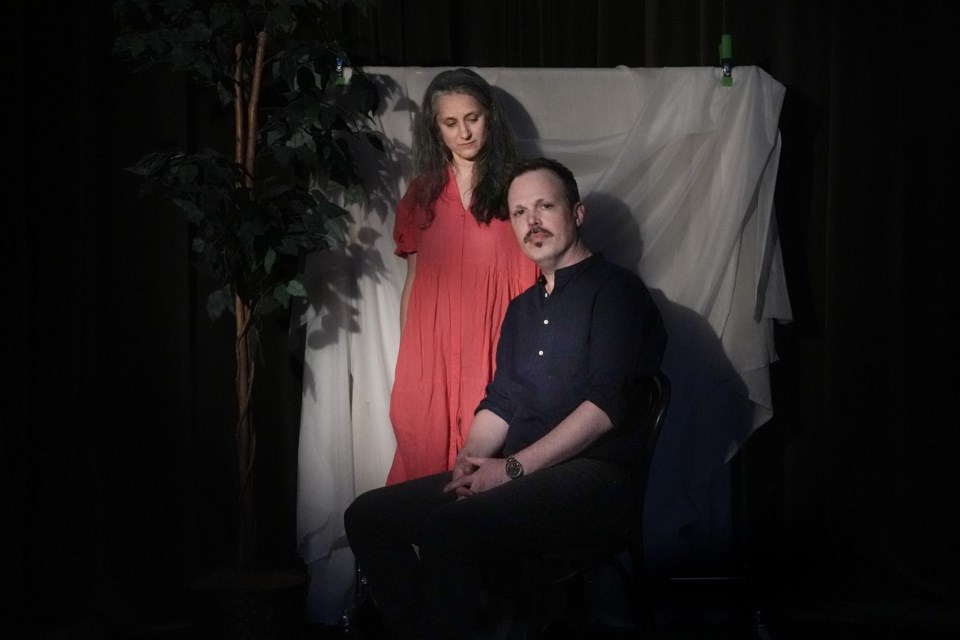TORONTO вҖ” A seasoned storyteller whose work often probes the complexities of consent and shades of truth, Hannah Moscovitch seems compelled to search for deeper meanings in both her plays and real life.
ThereвҖҷs rich significance, she suggests, in bringing her latest meditation on gender and power to a renowned Toronto theatre company once inextricably linked to allegations of sexual misconduct.
The celebrated playwright points out that вҖңRed Like FruitвҖқ hits Soulpepper several years after its co-founder and artistic director Albert Schultz resigned amid allegations of impropriety dating back years.
"They're trying to combat their own legacy,вҖқ Moscovitch says of being presented by Soulpepper, in collaboration with the Luminato Festival.
MoscovitchвҖҷs two-hander centres on a journalist whose investigation into a case of domestic violence leads her to reconsider the significance of her own past experiences.
Michelle Monteith plays the journalist Lauren, whose doubts about her own memory have her turning to a male character, Luke, played by David Patrick Flemming, to recount her own story back to her. The audience plays witness to Lauren's reaction to hearing someone else present details of her life, a twist on the unreliable narrator trope that raises questions about whose stories get told and whose voice gets heard.
Moscovitch, who visited similar themes in her Governor GeneralвҖҷs Award-winning play вҖңSexual Misconduct of the Middle Classes,вҖқ notes her first-ever show at Soulpepper comes after a #MeToo reckoning that included pressure to address long-standing inequities in the theatre world.
She credits current artistic director Weyni Mengesha with leading that charge.
вҖңShe's entirely changed that institution. I'm so admiring of her programming and her art and I think that she has already completely obliterated any legacy from Albert Schultz," says Moscovitch.
Four actresses sued Schultz in January 2018, claiming he groped them, exposed himself, pressed against them or otherwise behaved inappropriately. Schultz resigned and denied the allegations, saying he would defend himself. The lawsuits were settled that summer with undisclosed terms.
Mengesha is equally effusive in describing Halifax-based Moscovitch as a вҖңbraveвҖқ artist willing to tackle difficult topics.
Mengesha says she flew to Halifax last year to preview вҖңRed Like FruitвҖқ as it prepared for its world premiere at Bus Stop Theatre, quickly deciding it was important to bring it to Soulpepper.
"She explores things that are tough to talk about, like shame and definitely our own accountability as far as how we believe women or don't believe women,вҖқ Mengesha says.
"It's so personal and it's so honest. And what I love about her work is that it's a slow burn in some ways. It's always entertaining and really enjoyable to watch, but the effects of it вҖ“ you'll be considering it days after.вҖқ
вҖңRed Like FruitвҖқ is directed by MoscovitchвҖҷs husband, Christian Barry, who traces вҖңa direct lineвҖқ from its themes to those of вҖңSexual Misconduct,вҖқ which told of an affair between a married, middle-aged professor and his 19-year-old student. It's currently playing off-Broadway with Hugh Jackman and Ella Beatty.
Barry suspects an advantage in being married to the playwright of such charged fare, and he confesses they each have a hard time putting their creative projects aside at the end of the day вҖ“ work talk will invade conversations at the dinner table or pop up during school drop-off for their son.
Such familiarity is especially handy in directing вҖңRed Like Fruit,вҖқ he says, recalling multiple conversations with Moscovitch about her own eureka moments over past encounters.
вҖңThere's a lot of unspoken understanding between us about the subtext of what she's writing about. And I think ultimately, when you're sharing things that are this intimately connected with lived experiences, you just want to trust that they're going to be handled with care,вҖқ says Barry, artistic director of HalifaxвҖҷs 2b theatre, which marks its 25th anniversary this June.
вҖңAnd so she has trust in our relationship and in my ability to be able to see not just the text, but the subtext. Not just what's going on, but what it means to her personally and what it means to things that she's lived through that might be similar to what the characters are experiencing.вҖқ
Moscovitch says вҖңRed Like FruitвҖқ is not autobiographical but is partly informed by unsettling experiences sheвҖҷs had in a male-dominated creative sphere.
вҖқHaving been in the theatre community in Toronto in the 2000s, I would say that a certain amount of sexual misconduct was the price of admission,вҖқ says Moscovitch.
She says it's taken years to acknowledge and unpack problematic encounters in her own past, which she'd previously laughed off as a joke when recounting to others.
"Culture was informing how we were thinking about our own experiences, and we were both diminishing them and being silenced about them. And I think it creates real confusion, or it did for me,вҖқ she says.
вҖңYour first thought is, I'm so lucky nothing ever happened to me. And then you're like, 'Wait a second.... Every experience I've had actually, like, directly contradicts that,'" she says.
"And then you start to go into it вҖ“ You're like, was that bad or wasn't it bad? Is that just part of growing up? Is that trauma or is that experience?вҖқ
вҖңRed Like FruitвҖқ begins with a preview Wednesday and opens Thursday.
This report by The Canadian Press was first published May 28, 2025.
Cassandra Szklarski, The Canadian Press


